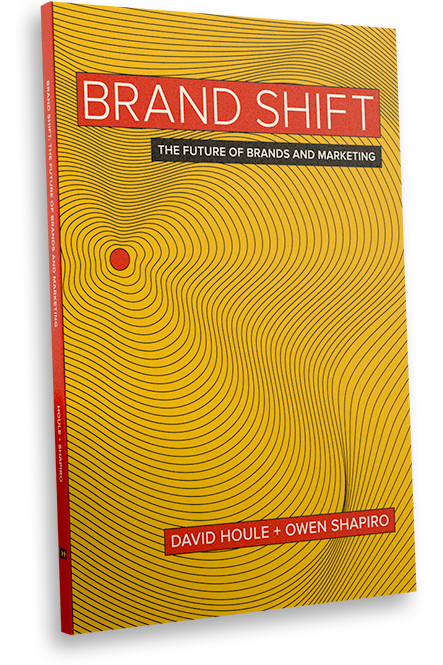"There are many books on how to build brands in the 20th century.
This is the first to show what it will take to build successful brands in the 21st century."
S. C. Johnson & Son Distinguished Professor of International Marketing
Kellogg School of Management, Northwestern University

“There are many books on how to build brands in the 20th century. This is the first to show what it will take to build successful brands in the 21st century.”
Philip Kotler
S. C. Johnson & Son Distinguished Professor of International Marketing Kellogg School of Management, Northwestern University
“I loved “Brand Shift”! It provides an insightful look into the future of how brands will be marketed. Houle and Shapiro address the trends and challenges marketing professionals will face in the future and offer clear concepts and strategies to ensure that CMOs can succeed in the years ahead. I finally have a clearer view of where to go!”
Ann Rhoades
President People Ink, Founding Executive Jet Blue and Former Executive, Southwest Airlines
“By offering a thorough understanding of the history of brands and how technology, artificial intelligence, and Big Data will influence marketing trends, Houle and Shapiro deliver a compelling strategy for navigating the inevitable global shifts already challenging marketing professionals.”
Scott Meadow
Professor of Entrepreneurship at University of Chicago Booth School of Business
“I’ve known David Houle since he was part of our team at MTV as we re-invented how brands connected to consumers in that era. Today, as media continues to evolve and brands are seeking to effectively connect with consumers wherever they are, on multiple platforms and devices, Houle and his co-author Shapiro are helping marketers understand how to make those connections now.”
Robert Pittman
Chairman and CEO of Clear Channel Communications
“Successful marketers embrace change as an opportunity to build stronger brands. "Brand Shift" provides a fascinating look at future social and technological changes that will create disruptive and powerful brand marketing opportunities. A must read for those responsible for future brand marketing.”
Mark Hansen
Former CEO PetSmart/President Sam's Club
“Brand Shift is for anyone and everyone who has anything to do with surviving and thriving is today’s turbulent, mobile, digital, instantaneous, real time, ‘Big Data' brand environment.”
John W. Lee II
Founder/Former CEO, Learning Curve International
“In a time when some argue that brands matter less, I’m the firmest believer that people need to connect with strong brands more than ever. This is a fascinating portrayal of how social and technological changes in the Shift Age will transform the future of brand marketing.”
Tom Trenta
Chief Strategist, Egg Strategy
“The future of brands and branding is here - IF you read this book. Houle and Shapiro’s ability to articulate future trends is invaluable to anyone that is in the business of managing a brand. Brand storytelling is going through significant changes and the Brand Shift is the roadmap. Read it. Now.”
Dave Kustin
Founder, Content Bacon
“David Houle could probably pick all the winners at the race track. I’d like to take him to Las Vegas but meantime I’ll read “Brand Shift”, written with Owen Shapiro, to find out how to take advantage of the next hot trends in marketing.”
Bob Sirott
WGN Chicago Broadcast Personality
“Bravo! This book is not only essential for all levels of marketing employees and students, it’s a ‘must’ read for all business professionals. The future, which is now defined as tomorrow, requires significant changes in marketing/branding to remain competitive. This insightful guide to the future is an excellent tool, so well written and organized that the concepts are easily grasped.”
Richard J. Kaplan
VP Marketing,
RCAD
Former President, Chief Brand Officer
Tervis Tumbler Co
“It’s easy to be aware that branding is changing, but exceptionally difficult to know where it’s going. This book clearly demonstrates that Owen and David’s understanding of the future of branding is unmatched in their industry.”
Seth Kravitz
CEO of Technori / Former CEO of InsuranceAgents.com
“A fascinating and thought provoking portrayal of how social and technological changes in the Shift Age will transform the future of brand marketing.”
Sam Guren
(30+ years as professional principle investor in venture capital/private equity)
Houle + Shapiro Interview
WSRQ Talk Radio
OCTOBER, 07, 2014
This podcast consists of David and Owen discussing their new book and views of the future of brands and marketing.

David + Owen Interview
WGN Talk Radio
OCTOBER, 21, 2014
Both David and Owen go over key points in BrandShift and discuss the next steps in marketing and brands.

Future of Brands and Marketing: The Golden Age
Amazon's Bestselling Author on the Future of Brands and Marketing
Brand Shift #2
Shapiro Radio Interview
WWVR Morning show
OCTOBER, 16, 2014
This podcast consists Owen Shapiro discussing social media, brands, marketing, and BrandShift.

Owen Talks About BrandShift
CJOB Nighthawk Show
OCTOBER, 07, 2014
This podcast consists Owen Shapiro discussing social media, brands, marketing, and BrandShift.

Owen Shapiro Interview
WMT Radio Interview
OCTOBER, 07, 2014
This podcast consists of David and Owen discussing their new book and views of the future of brands and marketing.

Owen Shapiro Interview
WTMJ Derrell Connor Show
OCTOBER, 19, 2014
This podcast consists of David and Owen discussing their new book and views of the future of brands and marketing.




